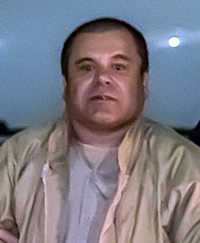
Drama-drenched El Chapo trial nears its end
Testimony highlighted by shocking claims, soap opera-worthy gossip

Mob News & Notes is a new monthly feature in the Mob Museum’s blog. It highlights recent stories on American and international organized crime that deserve some mention, in a brief format. It will enable us to expose our readers to articles, reports and issues affecting organized crime that we come across practically every day, but can’t necessarily write about in a long format. We’ll focus on the latest trends in organized criminal rackets, and the reaction of law enforcement to new challenges.
Gossip fuels El Chapo trial
“Telenovela worthy” was one media outlet’s clichéd description of the ongoing trial in federal court in Brooklyn, New York, of 61-year-old Mexican drug boss Joaquin “El Chapo” Guzman Loera. But it has developed into that kind of soap opera, if not in Latin America. While all Mob criminal trials are dramatic, Guzman’s has taken on a life that even the feds prosecuting him might not have foreseen. On the docket, he’s charged with 17 felony counts, from murder conspiracy to money laundering to drug trafficking and weapons charges on behalf of the Sinaloa cartel. Still, his trial has stretched beyond the dry narratives of Stateside mobsters and their familiar conspiracies. The proceedings, started in November, could go to the sequestered (and anonymous) jury sometime in February. Here are some of the reported highlights.
El Chapo’s wife takes center stage

Emma Coronel Aispuro, El Chapo’s 29-year-old wife, has made herself a spectacle in and out of the courtroom. Dressed in pricey clothes and large sunglasses, Coronel sometimes arrives outside the Brooklyn court beneath one or two umbrellas held by others. Her looks earn comparisons to the celebrity Kim Kardashian. She met Guzman at a dance when she was 17. Months later, she won a beauty pageant at the Coffee & Guava Festival in Canelas, Mexico, after her drug kingpin beau allegedly bribed the judges. She’s posed for pictures in a bikini and fired bullets at a shooting range while courting her 400,000 Instagram followers. She cavorts about the streets of New York with her and Guzman’s twin daughters, known to carry matching Louis Vuitton purses. Before each trial hearing, she saunters past the barking media dogs, who are sure to record her every facial expression in court. Coronel normally lives in a house in Mexico City. Born in California, the daughter of a Sinaloa opium and pot smuggler, she gave birth to her girls in Lancaster, California, to ensure their U.S. citizenship. She claims not to speak English and wears an earpiece to hear the trial translated in Spanish.
Mistress was engaged in drug trade
El Chapo’s mistress, Lucero Guadalupe Sanchez Lopez (like Coronel, 29 years old), a former Mexican congresswoman, agreed to appear as a government witness in hopes of reducing her potential 10-year sentence based on her guilty plea to drug sales conspiracy with the Sinaloa cartel. She spoke in court about her three-year relationship with Guzman and explained the difficulties of trafficking marijuana for him in the mountains of Mexico. She described how, at Guzman’s direction, she ran businesses used for laundering drug money in Mexico, Los Angeles and Ecuador. In 2014, she was in bed with Guzman in a Mexico hideout when Mexican marines and U.S. agents arrived. Guzman, totally naked, took her into an underground tunnel through which they escaped to a riverbed. Weeks later, police arrested Guzman while he stayed at a resort hotel with his wife and daughters.
At one point on the stand, Sanchez wept, provoking derisive laughter from Coronel in the gallery. “As far as today, I’m confused,” Sanchez said, oddly, about the kingpin. “I thought we were still involved romantically as partners.” The judge had Sanchez escorted from court for a while to regain her composure. On another day of testimony from Sanchez, Coronel came to court in a burgundy-colored velvet jacket that matched a jacket worn by Guzman. The news media crowed that it represented a statement of spousal solidarity against the ex-paramour.
Wife directed prison escape plan
One of El Chapo’s cartel soldiers, Damaso Lopez Nunez, testified that the kingpin’s wife Coronel “was giving us his orders” on how El Chapo wanted to break out of the Altiplano federal prison after she visited him there. She also took part in the complicated planning of his spectacular escape through a mile-long tunnel dug by his henchmen beneath his prison cell in 2015. Lopez related that after the Mexican military captured Guzman in 2016, the Sinaloa cartel sent a prison official $2 million to buy the kingpin a transfer back to Altiplano prison, but the Americans extradited him to New York in 2017 to face U.S. charges.
El Chapo’s former employees tell all

As of the third week of January, 11 one-time, high-level Mexican drug cartel men had testified against Guzman, most in bids to reduce the prison sentences they are serving, or might serve (some are in witness protection). The U.S. government estimates Guzman’s operation made him as much as $14 billion. One official estimated the illegal narcotics business in the United States takes in as much as $40 billion a year.
The trial revealed that two of Guzman’s former employees gave up a lot to avoid being targets for hitmen by landing in prison. One ex-Sinaloa cartel officer, Vicente Zambada, said that with his guilty plea to drug trafficking in 2013, he forfeited $1.3 billion. Another big actor, Juan Carlos Ramirez, told of how he had to fork over $1 billion following his trafficking arrest in 2007. Ramirez explained that being a drug lord required a hefty overhead to hide trafficked drugs and eliminate the troublesome. At one point, Ramirez testified how he paid hitmen in cash to kill 40 people to end a dispute among warring groups.
Claims of presidential bribes

In jarring testimony, Guzman’s former Sinaloa lieutenant Alex Cifuentes Villa claimed the kingpin in 2012 bribed then-Mexican President Enrique Pena Nieto to the tune of $100 million to cancel the country’s nationwide search for him while he was still on the lam from a 2001 prison escape. Nieto’s former spokesman vehemently denied it, saying that under Nieto, authorities captured El Chapo in 2014 (however, Guzman’s 2015 escape from Mexican federal custody happened while Nieto was still president).
Armenian crime crew caught fixing tennis matches
Organized crime has corrupted many types of sports to stack the deck for its bookmakers, but tennis matches?
Yes, according to Europol, Europe’s equivalent to the FBI. In early January, the Spanish Civil Guard, with the assistance of Europol, arrested 83 people, including 28 professional tennis players, after an investigation found that a criminal network run by ethnic Armenians in Spain arranged to fix least 97 tennis matches. The matches in question took place during the International Tennis Federation Futures and Challenger tournaments. Both organizations oversee pro tennis matches for members from many nations.
Europol’s probe started after the London-based Tennis Integrity Unit, an anti-corruption body that monitors tennis competitions, learned in 2017 of allegations that many players scheduled to play in ITF Futures and Challenger tournaments received bribes to predetermine match outcomes for bookmakers. The Armenian leaders of the scheme used the identities of thousands of people to place bets on the fixed matches. The criminals recruited one professional player to act as the go-between for the gang and the players. After giving players money, the network sent members to the matches to make sure the assigned competitors agreed to play in a fraudulent manner as planned. Then the gangsters told their group to place wagers, both nationally and internationally. Spanish police raided 11 houses, seized 167,000 Euro in cash, more than 50 electronic devices, some luxury vehicles and documentary evidence, and froze 42 bank accounts.
Popular video game Fortnite used to launder money

Fortnite, the free online video game launched in September 2017, has evolved into the world’s most popular video game, with more than three million people contending at once and an estimated 200 million registered players. Epic Games, Fortnite’s developer, earned about $3 billion from the game last year.
Fortnite’s free “Battle Royale” game centers on 100 participants – players disguised as their chosen digitized characters (male, female and multi-racial) — placed on an island and fighting each other in a desperate attempt to survive. The “last one standing” of the 100 is the winner.
Unfortunately, this game, played mainly by kids, has been infiltrated by organized crime, according to the British online newspaper The Independent. The crime is money laundering, a basic way organized mobsters and thieves hide their ill-gotten gains from authorities and cover up their crimes.
These crooks use stolen credit card numbers to purchase Fortnite’s online game currency, V-bucks, and then sell them at a discount rate on the dark web, the stealth online marketplace where cybercriminals facilitate crimes such as selling stolen property.
In Fortnite, players use V-bucks to buy items offered by the online game’s store, and, technically, nowhere else. However, the crime group using the pilfered credit card numbers buys the bucks, then offers them for sale on the cheap through advertising on social media sites such as Facebook and Instagram. Whenever the criminals make a sale on the credit cards, they launder some of their stolen funds. The criminals are running the scheme in English and four other languages. V-bucks and Fortnite game “skin” accounts are also selling briskly on eBay.
Feedback or questions? Email blog@themobmuseum.org





